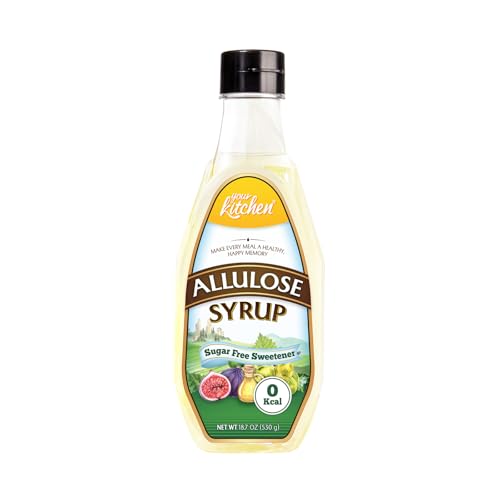The Best Low-Carb Fruits for Keto: Essential Eating and Avoidance Guide
This post may contain affiliate links. If you purchase through these links, I may earn a small commission at no extra cost to you. LEARN MORE.
Many people who start a keto diet are unsure which fruits fit into their low-carb lifestyle.
While most fruits are high in sugars, several options fit well with the ketogenic eating plan.
Some of the best low-carb fruits for a keto diet include avocados, strawberries, raspberries, and lemons.
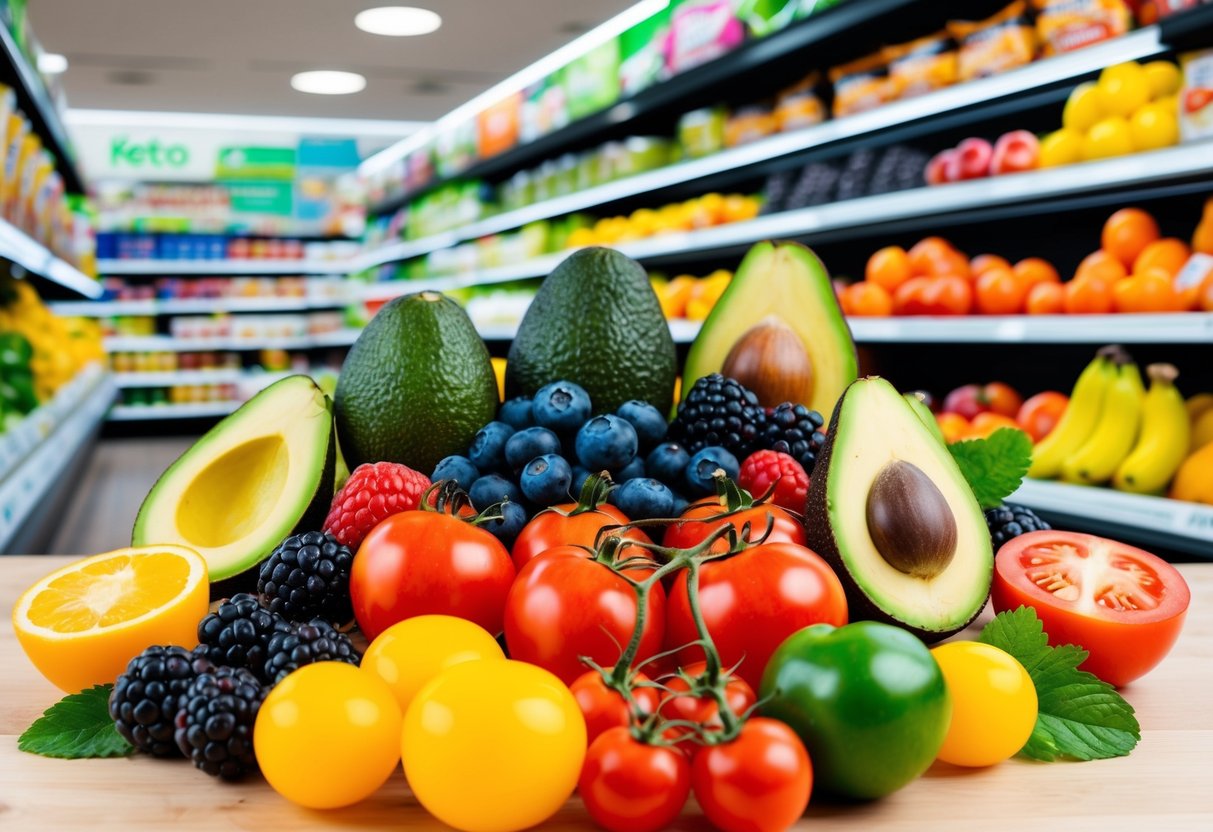
Recognizing which fruits to enjoy and which to avoid can help maintain ketosis and ensure success.
Incorporating these fruits in moderation allows for a more varied and enjoyable diet without breaking carb limits.
This blog will explore the fruity possibilities and benefits of adding these choices to a keto diet.
Understanding the role of these fruits can aid in making informed decisions while enjoying a healthier lifestyle.
Check out our Keto Shopping Guide for more detail.
Unlock personalized guidance with our Custom Keto Diet program and master your metabolic journey!
Key Takeaways
- Avocados and berries are top picks for low-carb diets.
- Most fruits are high in carbs and should be minimized.
- Low-carb fruits can add variety and nutrients to meals.
Understanding Keto and Low-Carb Diets
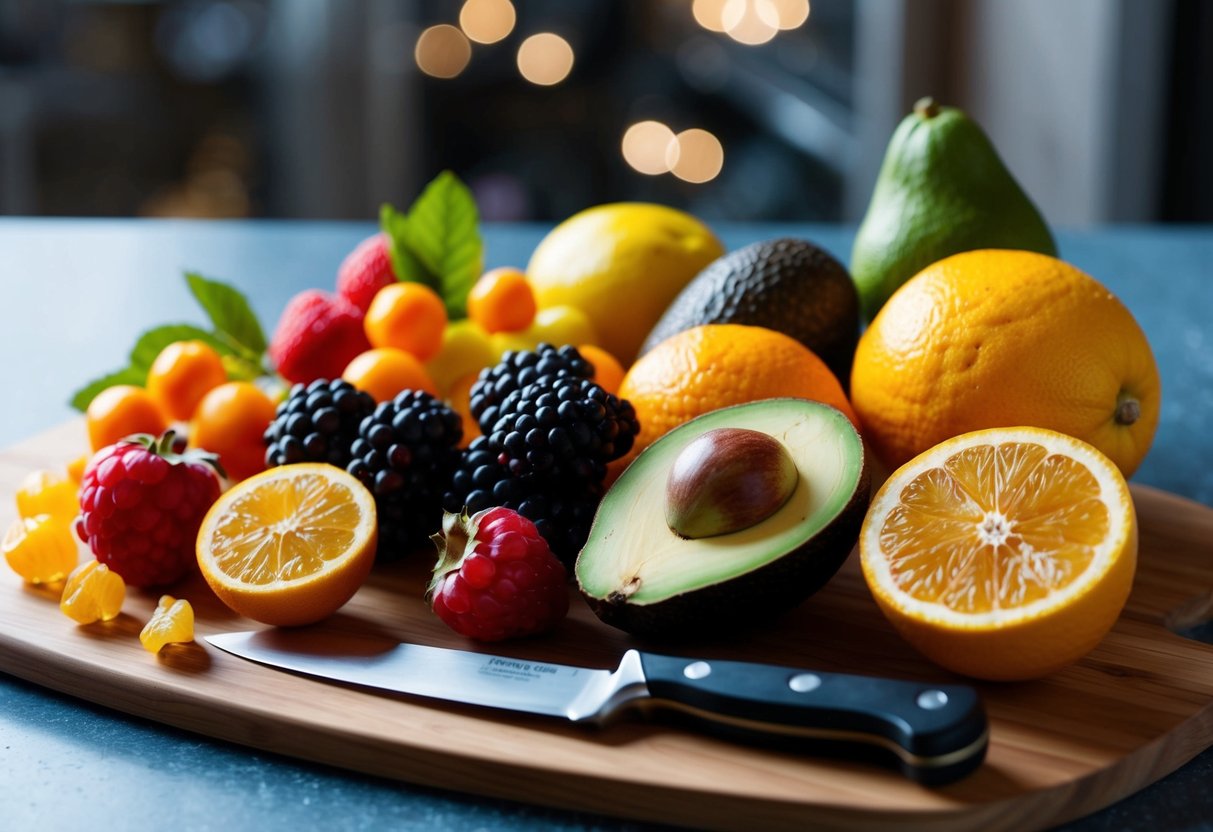
The ketogenic diet involves consuming high-fat and low-carb foods, which encourages the body to enter a state called ketosis.
Low-carb fruits play an essential role in providing necessary nutrients without disrupting ketosis.
The Basics of the Ketogenic Diet
A ketogenic diet focuses on reducing carbohydrate intake and increasing fats.
By doing this, the body shifts from using glucose as its primary energy source to using fats.
This metabolic change leads to a state called ketosis.
In ketosis, the liver converts fats into ketones, which are used as energy.
Maintaining ketosis requires keeping carb intake very low, usually around 20-50 grams per day.
This significant reduction in carbohydrates encourages the body to burn fat for fuel.
For more detail about how keto work, learn from our guide on When Does the Keto Diet Start Working? Unlocking Speedy Fat Loss Results.
Importance of Low-Carb Fruits in Keto
Low-carb fruits can be included in a keto diet but should be selected carefully.
They provide fiber, vitamins, and minerals without adding too many carbs.
Berries like raspberries and strawberries are popular as they have fewer carbs compared to other fruits.
Lemons and avocados are also keto-friendly due to their low-carb content.
They add vital nutrients and flavor while maintaining low carbohydrate levels.
Choosing the right fruits helps keep the body in ketosis, supporting the diet’s goals.
Properly incorporating these fruits ensures nutritional balance in a low-carb lifestyle.
Monitor ketosis levels after eating fruits, check out best selling keto test stripes from Amazon below.
The Best Low-Carb Fruits for Keto
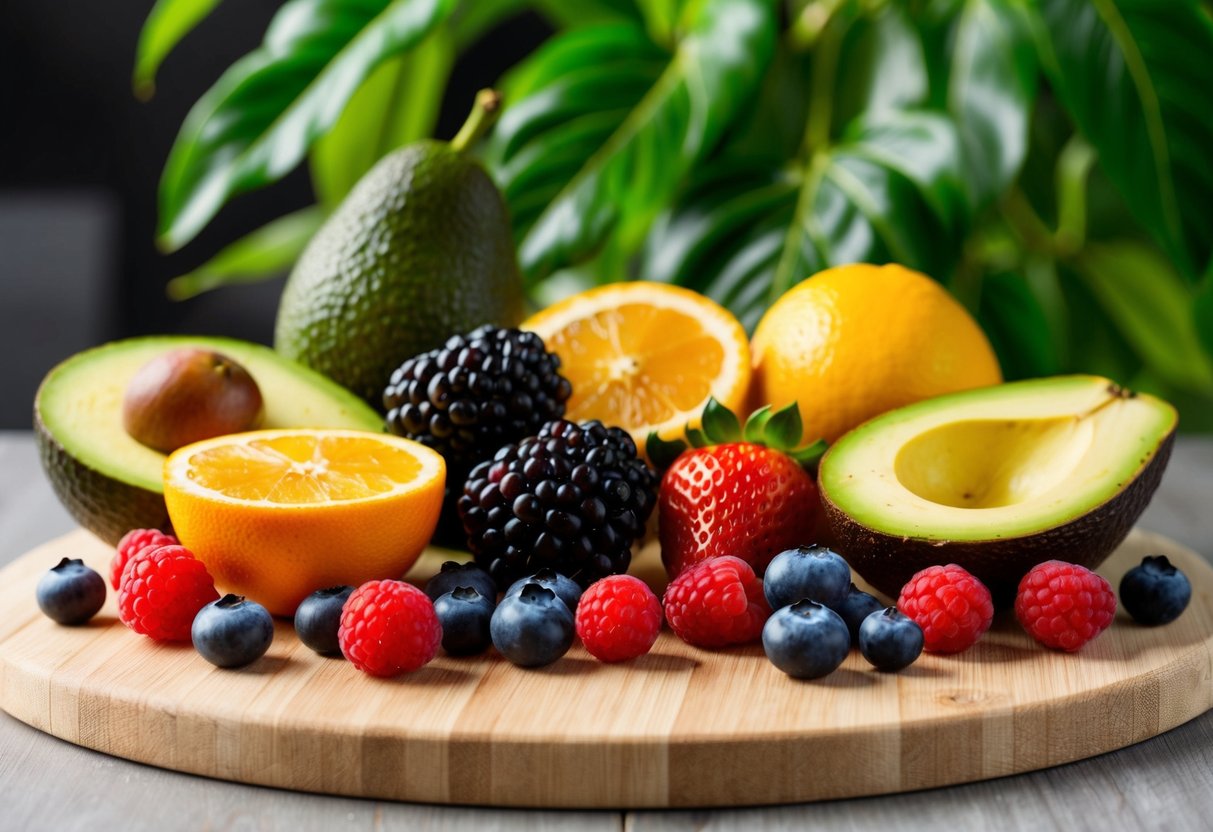
Maintaining a keto diet requires a careful selection of fruits that are low in carbohydrates yet high in nutrients.
Some of the best fruits for this diet include avocados and various types of berries, each offering unique benefits while keeping net carb intake low.
Avocado: The Ultimate Keto Superfood
Avocado stands out as a prime choice for those following a keto diet.
Rich in healthy fats and low in carbohydrates, it provides a creamy texture and versatile flavor.
A single avocado typically contains about 2 grams of net carbs, making it an excellent staple.
The fruit is packed with fiber, which aids digestion and increases satiety.
It also contains essential nutrients such as potassium and folate.
Including avocados in your diet supports overall heart health and boosts nutrient absorption.
Berries: A Nutritional Powerhouse
Berries are another excellent choice for keto followers.
Raspberries, blackberries, and strawberries are particularly keto-friendly.
They are lower in carbs compared to other fruits and are high in fiber, allowing for moderate consumption.
These berries are loaded with vitamins like vitamin C and are known for their antioxidant properties.
Raspberries and blackberries each have around 5-6 grams of net carbs per serving, while strawberries contain about 6 grams.
Including these in your diet helps maintain ketosis while offering delicious flavor.
Other Keto-Friendly Fruits to Include
Beyond avocados and berries, there are other fruits that cater to the keto diet.
Lemons and limes add zesty flavor with minimal carbs. Olives offer healthy fats and a savory option with low net carb counts.
Additionally, tomatoes provide a touch of sweetness and are low in carbs. Coconut, with its high fiber content, also fits within keto guidelines.
These fruits diversify your diet while adhering to keto principles.
Net Carbs Per Serving: A Quick Reference Guide
Keeping track of net carbs is essential for those on a keto diet. Here’s a quick guide to the fruits mentioned:
- Avocado: ~2 grams net carbs
- Raspberries: ~5 grams net carbs per serving
- Blackberries: ~6 grams net carbs per serving
- Strawberries: ~6 grams net carbs per serving
- Olives: ~1 gram net carbs per serving
- Lemon and Lime: ~5 grams net carbs per whole fruit
This guide aids in making informed choices while ensuring your carb intake remains within desired limits.
Find out more about keto snacks, read 10 Quick and Easy Keto Snacks to Keep You Energized All Day here.
Fruits to Limit or Avoid on Keto
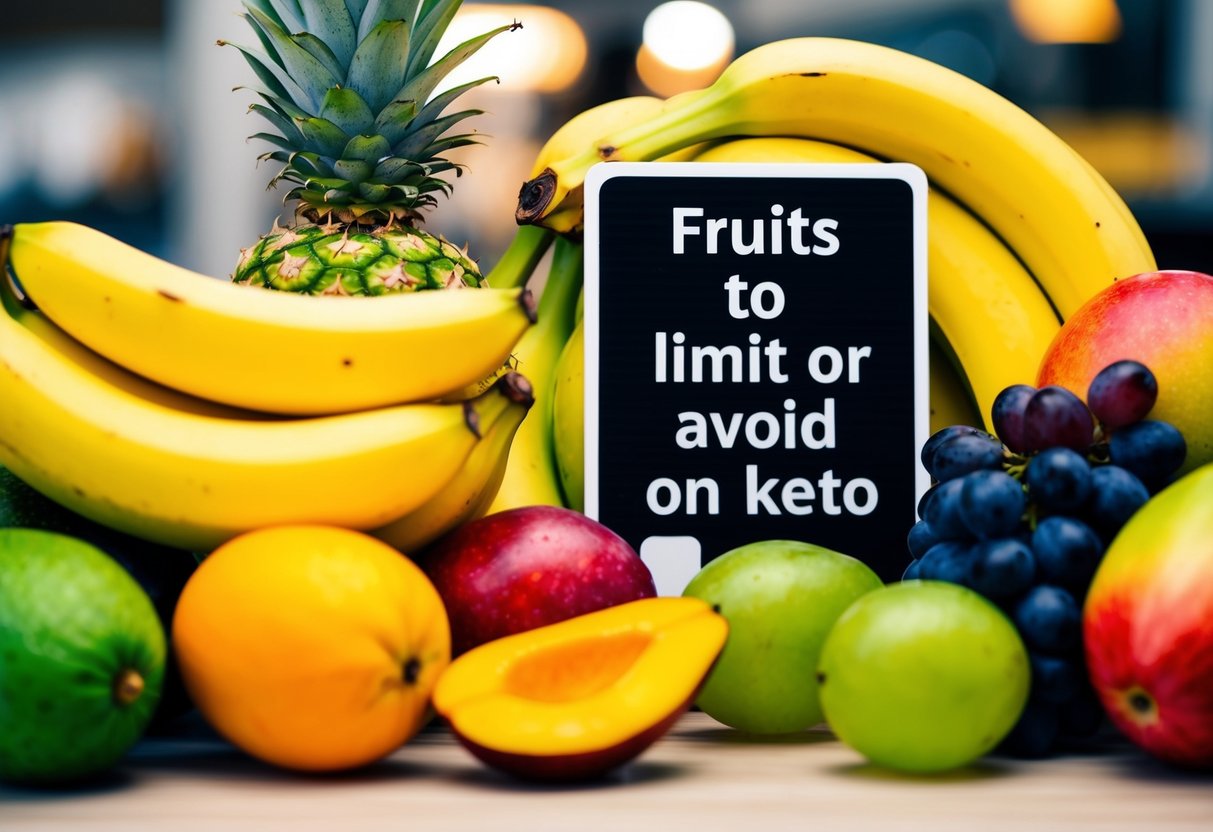
On a keto diet, it’s crucial to keep track of fruits high in natural sugars. These can increase carbohydrate intake quickly.
Some fruits, like bananas and mangoes, are particularly high in sugar and should be avoided or eaten sparingly.
High-Sugar Fruits to Watch Out For
Many fruits contain high levels of natural sugars, which can disrupt ketosis if consumed in large amounts.
Bananas, apples, and grapes are high in carbohydrates. A single banana has about 27 grams of carbs, a figure too high for those on strict keto regimens.
Mangoes and oranges also contain significant sugar levels.
Mangoes have about 24 grams of carbs per cup, which can limit their inclusion in keto meal plans.
Oranges, although refreshing, contain around 12 grams of carbs per medium fruit.
Other fruits to be careful with are pineapples and cherries, which also have high natural sugar content.
Understanding the Impact of Natural Sugars
It’s important to differentiate between natural sugars and added sugars.
Fruits like watermelon still have natural sugars that can impact blood sugar levels.
High intake of these sugars may pose risks for those with type 2 diabetes or insulin sensitivity.
Natural sugars trigger insulin responses. Eating fruits like high-carb bananas can cause blood sugar spikes, something keto aims to minimize.
Opt for lower-carb fruits to maintain ketosis.
While fruits provide essential nutrients, their sugar content may count against carb limits.
Assess carb content carefully to stay within dietary goals.
What are keto friendly sweetener, find out below.
Nutrition and Health Benefits of Low-Carb Fruits
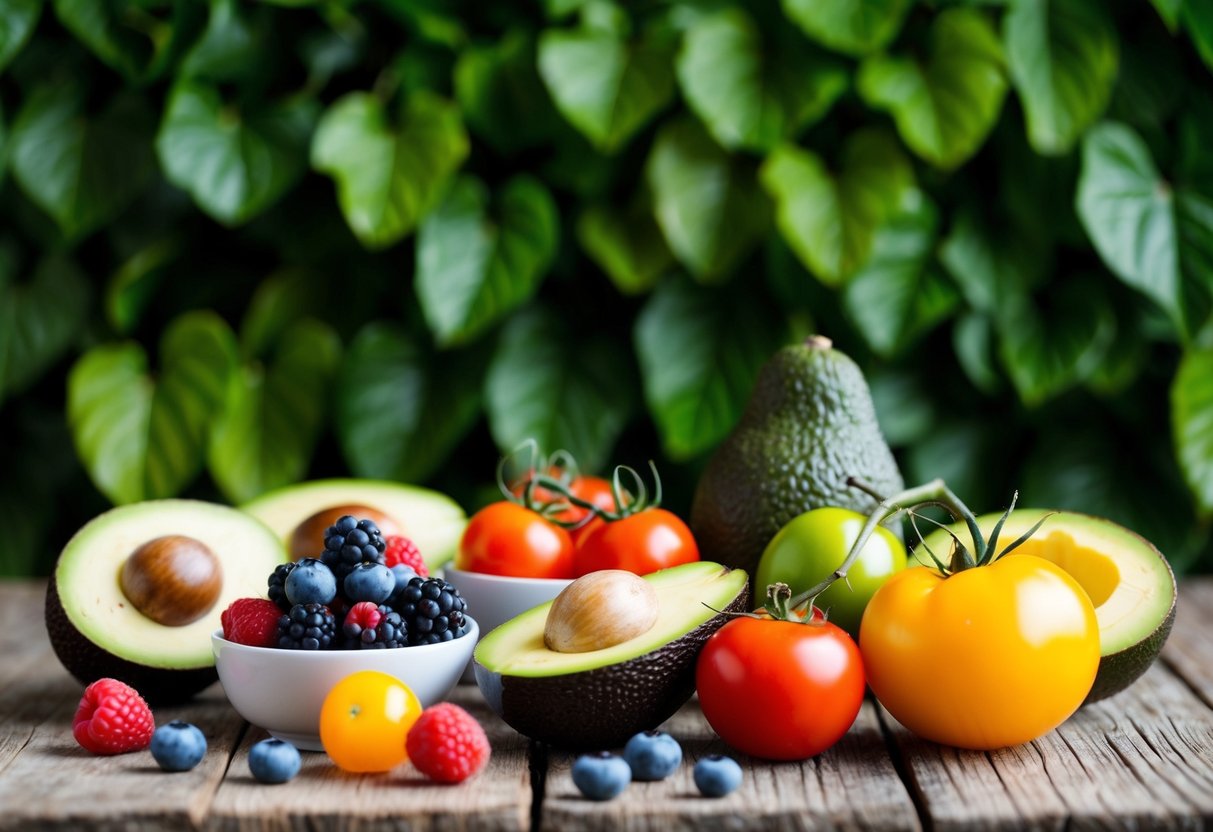
Low-carb fruits can offer significant health advantages. These fruits are rich in essential nutrients like vitamins, fiber, and antioxidants, supporting overall well-being and helping with weight and diabetes control.
How Fruits Fit into Your Overall Health
Low-carb fruits provide essential vitamins and minerals vital for health.
For instance, many of these fruits are high in vitamin C, which boosts the immune system and aids in repairing body tissues.
They also contain antioxidants that combat oxidative stress, supporting heart health.
The fiber content in low-carb fruits is another crucial benefit.
Fiber aids digestion and helps maintain stable blood sugar levels.
This can be especially beneficial for those managing or at risk of developing type 2 diabetes.
The dietary fiber in fruits like berries and avocados helps maintain healthy cholesterol levels, reducing the risk of heart disease.
Discover additional health benefits of low-carb eating in our Keto Diet for Immune Health: Enhance Defenses Through Diet article.
The Role of Fruit in Weight Management and Diabetes Control
Including low-carb fruits in the diet can support weight management.
Fruits such as berries and melons have a low calorie count but are high in water and fiber, helping individuals feel full for longer periods.
This can reduce overall calorie intake, aiding weight loss.
For those with diabetes or aiming to prevent it, low-carb fruits are advantageous.
Fruits with low carbohydrate content and a low glycemic index, like berries, can help regulate blood sugar levels effectively.
Magnesium present in some fruits can also aid insulin function, playing a role in diabetes control.
Additionally, these fruits help manage triglyceride levels, crucial for overall metabolic health.
Feeling inspired? Kickstart your own journey with our 7-Day Custom Keto Diet Plan for Beginners and join the success stories today!
Incorporating Low-Carb Fruits into Your Keto Meal Plan
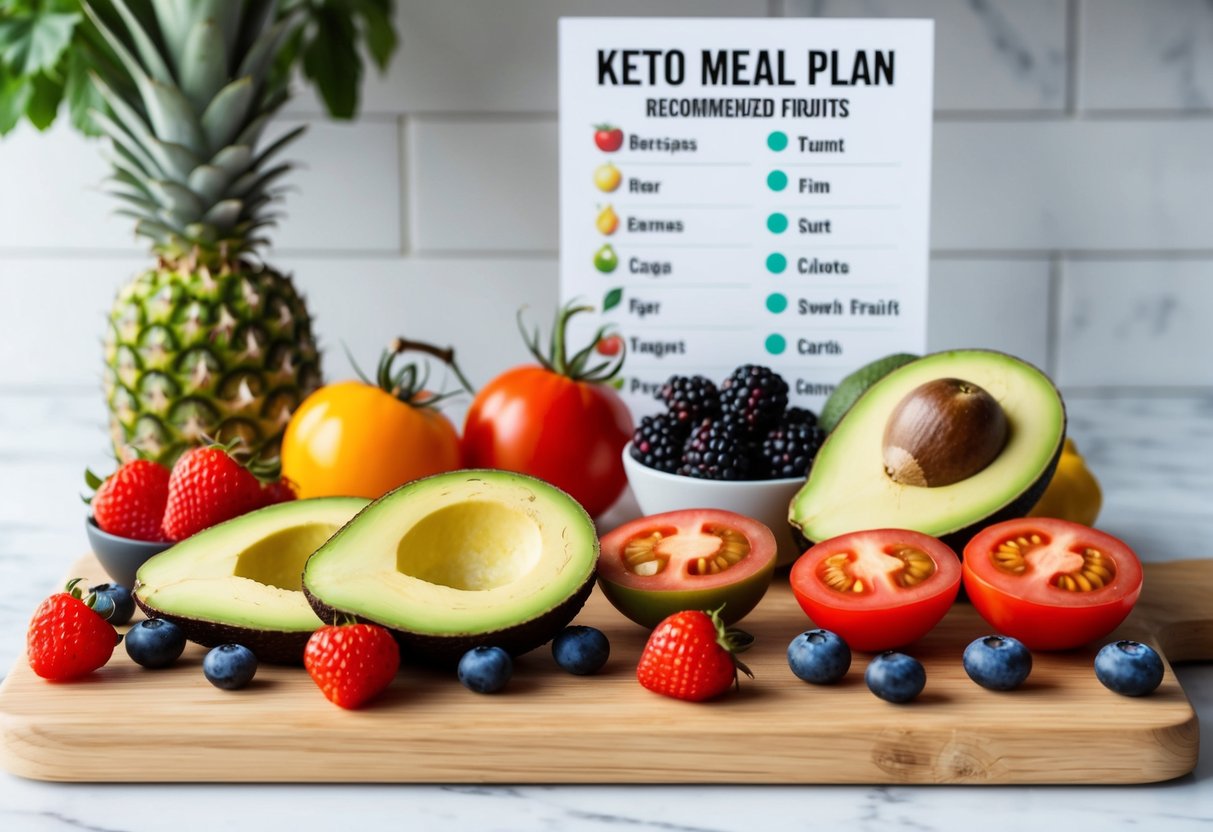
Low-carb fruits can add variety and nutrients to a keto diet.
They are versatile and can be combined with nuts, seeds, and other keto-friendly foods for tasty meals.
Creative Ways to Enjoy Keto Fruits
Fruits like avocados and berries can be mashed or blended into smoothies.
Blend them with Greek yogurt for a creamy treat.
Shredded coconut can add texture and flavor when sprinkled on yogurt or keto desserts.
Nuts and seeds pair well with berries for a quick snack.
These combinations not only satisfy cravings but also complement a keto lifestyle by providing healthy fats and fiber.
For more recipe ideas, check out our Keto Recipe Ideas: Delicious Meals for a Low-Carb Lifestyle post.
Shopping and Storing Tips for Freshness
When shopping, select firm berries and avocados. The firmness is a good indicator that they are fresh.
Shop seasonally for the best flavors.
Storing berries in airtight containers in the fridge can extend freshness.
For avocados and other low-carb veggies, store them in a cool, dry place or refrigerate.
Always wash fruits thoroughly before storing to remove any residue and bacteria.
Check out the best selling airtight container from Amazon below.
Keto-Friendly Fruit Recipes (Simple & Delicious Ideas!)
Try a berry and Greek yogurt parfait. Layer fresh berries with Greek yogurt and top with shredded coconut and nuts.
For a light lunch, create a berry and spinach salad with avocados and a sprinkle of seeds.
Simple coconut berry smoothies made with unsweetened almond milk are also refreshing.
These recipes are low in carbs but rich in taste and nutrients, perfect for keto enthusiasts seeking variety.
Frequently Asked Questions
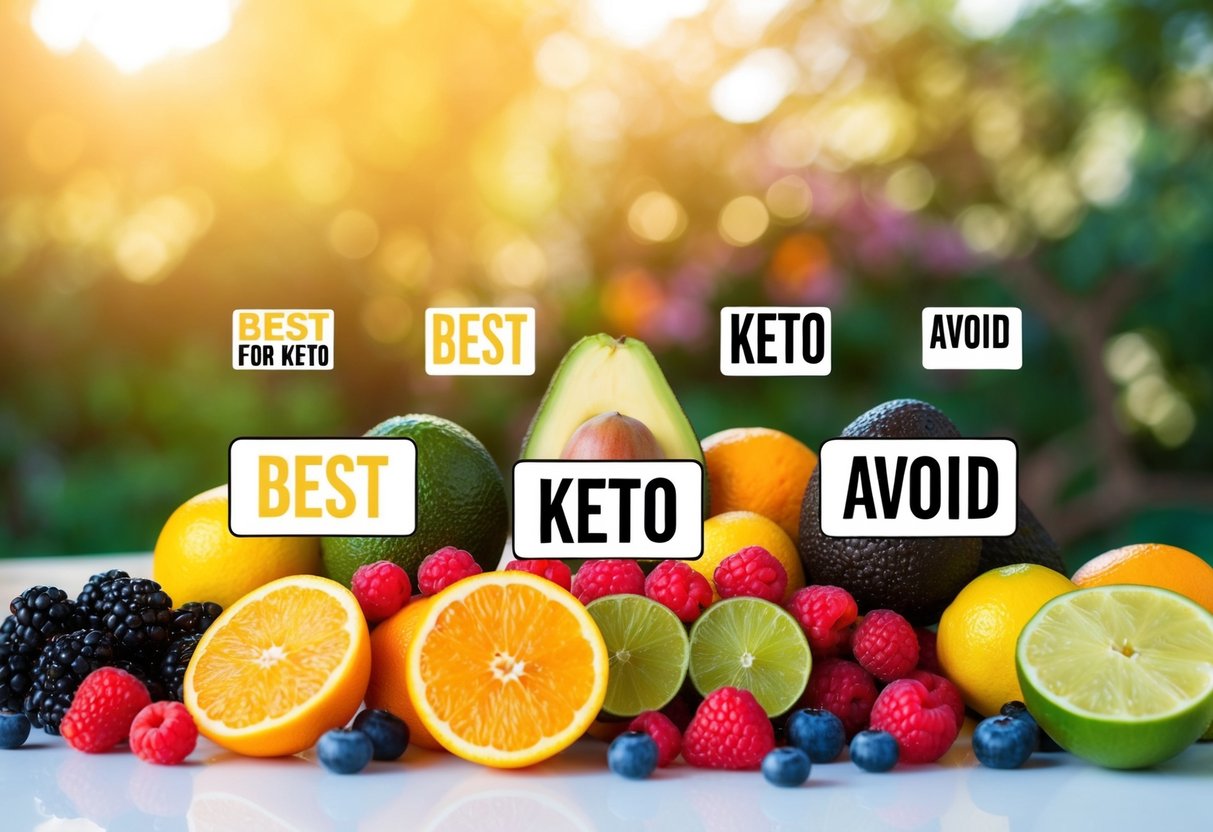
On a ketogenic diet, selecting fruits requires careful consideration. Some fruits are low in carbs and fit well into this lifestyle, while others should be limited or avoided.
Exploring specific fruit options can help maintain ketosis.
What fruits are considered keto-friendly and low in carbohydrates?
Berries like raspberries, blackberries, and strawberries are excellent choices due to their low carb content. Avocados and tomatoes are also keto-friendly options.
These fruits offer essential nutrients while keeping carbohydrate intake low, supporting the ketogenic lifestyle.
Can you eat watermelon on a ketogenic diet?
Watermelon is higher in carbs compared to other keto-friendly fruits. While it’s not ideal for strict keto followers, small portions can be enjoyed occasionally.
It’s important to monitor overall daily carb intake to ensure it remains within the desired limits for ketosis.
Which fruits should be avoided when following a keto diet?
Fruits high in carbohydrates, such as bananas, grapes, and apples, should generally be avoided on a keto diet. These fruits can quickly increase daily carb intake, making it harder to stay in ketosis.
Limiting or avoiding them helps maintain low carbohydrate levels.
How do blueberries fit into a ketogenic eating plan?
Blueberries contain more carbohydrates than other berries, like strawberries or raspberries. Although they can be included in moderation, it’s wise to monitor portion sizes carefully.
Small servings ensure that one stays on track with their carb goals without sacrificing sweet fruit flavors.
What are the top fruit choices for someone on a low-carb diet?
For a low-carb diet, berries such as strawberries, blackberries, and raspberries lead the list. Avocados, cucumbers, and tomatoes also rank highly.
These fruits have low sugar content and provide necessary vitamins and minerals, making them excellent choices for those minimizing carbs.
What fruit has the fewest carbs and is best for keto?
Avocados are among the best fruits for keto as they are low in carbs and rich in healthy fats. They enhance nutritional intake while maintaining ketosis.
Berries such as raspberries and strawberries also have a low carb count, making them suitable for those on a ketogenic diet.
Conclusion
Choosing the right fruits for a keto diet is essential for maintaining low carb intake while enjoying health benefits.
Fruits like avocados, strawberries, and raspberries are great options. They are low in carbs and offer essential nutrients.
Avoid high-sugar fruits like bananas and grapes, as they can disrupt ketosis.
Low-carb fruits are not only nutritious but also add variety and flavor to meals.
Ready to transform your keto journey with a personalized approach? Discover our Custom Keto Diet now and unlock a world of low-carb recipes that make healthy living delicious!



